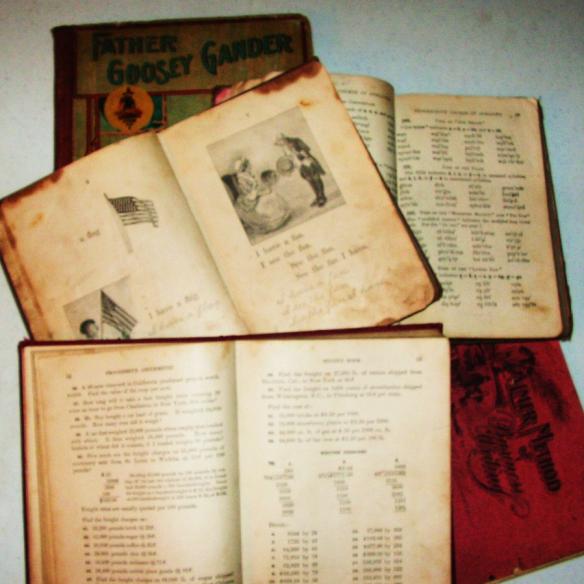OLD Books ~~~~~~~~~~~~~~ by Ken Bain
It is the first day of a new decade. Today I discovered a big box of old books that had until now escaped my investigation. The contents probably were retrieved from my parent's attic after dad died thirteen years ago, and were stowed away for later perusal. Nearly all are around a hundred years old. Among the dusty and brittle volumes was a story book, "Father Goosey Gander". Likely my mother's first book, it was signed by my Grandmother on December 25, 1913. Mom was six and a half years old. It is the first time I have seen my Grandmother's signature. She passed away not many years later.
Old schoolbooks and even a couple of volumes belonging to my dad, whose rural childhood poverty only allowed him three years of formal education, are a treasure-trove of heritage. But especially important to me personally is one book that is "only" fifty-five years old. It is written by B. Frank Belvin, an Indian pastor/missionary. The book is a story in itself.
Ever since God called Thurleen and me to be missionaries to Tohono O'odham Indians in the Arizona desert, I have remembered a story and retold it many times. It seems that when I was about eleven, a missionary visited our church and told of his work with Arizona Indians. I never forgot it. That also was the year that I received Christ as my Savior, an event of eternal dimensions. Belvin's book, "the Tribes Go Up" tells of Southern Baptist pioneering missions to Native Americans all over the United States up until 1955.
Pastor Belvin concludes the book, telling a gripping story about a Papago (now Tohono O'odham) Indian called Whirling Thunder. I believe that he probably used "Indian" names in place of their common names.
The story goes:
Whirling Thunder lay on his deathbed. His body was wracked with pain. The arms, once strong to pull the bowstring, had wasted away. His dark brown eyes, once keen like the eagle's, looked into eternity and only saw darkness.
"What will become of my soul?" he muttered. "Won't somebody come and tell me what to do with my soul? It is all dark out there."
Little Flower, his wife, moved close. She bent over the frail form that was once a strong brave. The strength of youth had fled and the tracks of pain dug deep into his brown face. Her eyes were filled and her heart fluttered as if pierced by a hunter's well-aimed arrow as she heard him gasp again,
"What will become of my soul? It is dark out there."
So, without hearing the plan of salvation, Whirling Thunder passed away begging,
"Won't somebody come and tell me what to do with my soul?"
The overworked missionary heard of his request too late. But he did help make the simple little coffin and prepare the grave in the cactus field not far from the hills. Then he told the story of Jesus and the plan of salvation to the sorrowing Little Flower. A flicker of hope rushed across her face. In passing, it seemed to say,
"This is what Whirling Thunder wanted."
Now Jesus is in her heart, where once her burden tore like an eagle's claw at the tendons of his prey. And now as she weaves in and out of the cacti she tells of the peace that has come to stay. The Little Flower regrets only that her warrior fell begging for someone to tell him what to do with his soul.
After such tragedies the missionaries will not be the same. They never are, for the tragedies among their people pile themselves one upon the other like the snows upon Hermon. They make their mark upon God's servants, who are all things to all men that they might save some. Servants, sensitive to the needs of bewildered humanity, shoulder the people's burdens as though they were their own and walk side by side with the sons of the desert.
The missionaries still ride the winding desert roads and climb the dusty mountain trails. Sometimes they pause in the high places. From these unobstructed vantage points they can see village after village where the message has not been told. To most people there would be seeming silence. But to the sensitive ears of the desert missionary there is the voice of the wind as it plays on the organ-pipe cactus. Always it seems to say,
"It is dark out there. Why doesn't someone come and tell me what to do with my soul?"
Last year (five or six decades after pastor Belvin recorded this story), I saw the same "Flicker of hope rush across the face" of an Indian woman in the same desert, not long before she died. This time the missionary was able to get there in time.
Ken Bain
~~~~~~~~~~~~~~~~~~~~~~~~~~~~~~~~~~~

